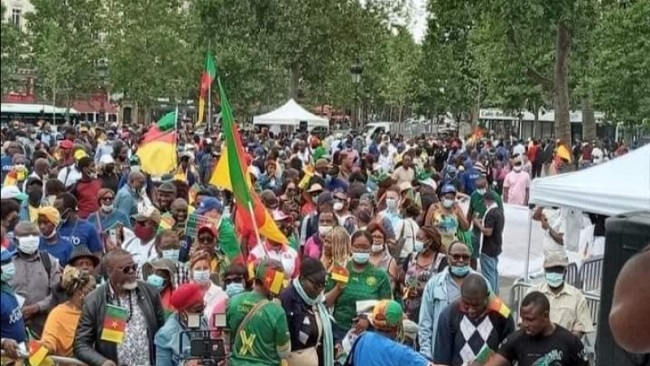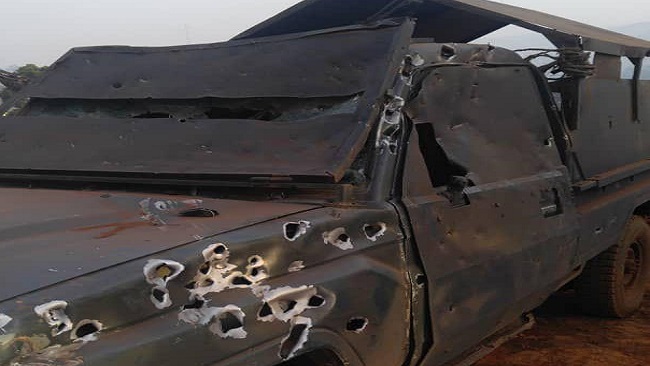4, July 2021
Cyprus: Southern Cameroonian asylum seekers trapped in no man’s land 0
Looking for a new beginning, a trio from Cameroon jumped from the Venetian walls into what they thought was Nicosia. They remain stuck in the buffer zone six weeks later
Three young Cameroonian asylum seekers stranded in the buffer zone near the Ledra Palace since the end of May say they have been repeatedly denied access to the asylum services of the Republic.
Grace, Daniel and Emil jumped down from the Venetian Walls in the Arab Ahmet district of north Nicosia’s old town into the buffer zone at around midnight on May 24.
New to Nicosia and not fully aware of the Green Line’s configuration, the Cameroonians thought their leap would land them directly in the southern part of the divided capital. Instead they found themselves in the middle of no-man’s land when, minutes later, they were approached by an Unficyp patrol.
“The Cameroonians were first approached by the Unficyp patrol at midnight, on May 24,” said Public Information Officer of the UNHCR’s Cyprus office Emilia Strovolidou, which has been trying to negotiate the marooned trio’s future with the authorities here ever since.
“Unficyp approached the police [on their behalf] but they were refused access to the asylum procedures. Since then they remain stranded in the buffer zone, without access to the reception conditions, including food and water. We have been providing immediate assistance to them but they are in a precarious situation. They live in one tent and there is not enough space there so some of them have to sleep outside; the weather and sanitary conditions are dire.”
All three are from Anglophone Cameroon, which has been in the grips of fighting since 2017 as rebels try to break away from the predominantly Francophone government. More than 3,500 people have died and 700,000 have been displaced in the violence.
Thirty-three-year-old Emil deserted the army late last year. He told the Sunday Mail that as an Anglophone he could no longer accept the military’s actions against his fellow citizens.
Grace, aged 23, came to the north in February. She left Cameroon after her foster parents died in an accident and the uncle with whom she then went to live started abusing her sexually.
Daniel, aged 20, was approached by the Amba Fighters. He refused to join the militia group.
“My life was in danger. My parents arranged for me to come to study here. I came in March but I quickly realised there was no work. I had to start looking for a better solution.”
Strovolidou points out that it is a universal human right to seek asylum.
“These three persons presented themselves and asked for asylum, thus access to the asylum process and reception conditions provided by law must be ensured,” she said.
When she visited the island in April, the UNHCR’s Assistant High Commissioner for Protection Gillian Triggs was assured that asylum seekers “will be allowed access to the national asylum procedures.” UNHCR had previously received reports of pushbacks at sea and incidents of asylum-seekers stranded in the buffer zone.
Asked by the Sunday Mail why the Cameroonians had not been granted their rightful access to asylum procedures, the interior ministry insisted that Cyprus adheres to its duty of care for asyslum seekers but noted that when over 70 per cent of the migrant influx involves arrivals from Turkey by boat or crossings from areas where the RoC cannot exercise effective control, force majeure prevails. Cyprus, it maintained, cannot host any additional persons due to the severe burden put upon in the reception system.
The alternative, the ministry suggests, is that the European Union should create a re-allocation programme similar to that functioning in Greece.
The ministry has informed the EU Commission officially that “we stand ready to provide for the transfer of any persons to other member states.” The authorities now await a response from the Commission as to whether it is possible to relocate the Cameroonians accordingly.
European Commission sources confirm the receipt of the ministry’s letters but say that no mention was made of the specific case of the Cameroonians .
In the meantime the trio say they are determined to stay in the buffer zone until they are allowed to apply for asylum.
“It wasn’t our plan to get stuck here but what else can we do? By jumping this wall, we broke the law in the north. If we go back there we could go to prison and get deported. What we need is a new beginning. And freedom.”
Source: Cyprus-mail.com



























4, July 2021
Southern Cameroons Crisis: Their arrogance is hurting the country 0
Cameroon has been in the throes of a military conflict for more than four years now and the violence has continued to claim both civilian and military lives.
In Bamenda on Sunday, a young man was killed by soldiers in a neighborhood known as “Below Foncha” and this killing has revolted young people in the city of Bamenda, sending thousands of them to the streets.
The latest killing has resuscitated old demons, with many young people calling on the military to pack and leave their land.
The military check-point where the young man was gunned down has been dismantled by angry youths who say they were sick and tired of the military brutality that the country’s arrogant government has unleashed on the Southern Cameroonian population.
The killing will surely not be ending anytime soon. Over the last month, Southern Cameroonian fighters have been killing army soldiers like flies and this has created doubts in the minds of many politicians who were counting on the military for a fast and clean military operation.
But Southern Cameroonian fighters are not ready to turn down the heat on the military. They have found new ways of demystifying the soldiers, especially officers of the Brigade d’intervention rapide (BIR) which had been touted as the finest and the best in the business of suppressing the population.
The news of Southern Cameroonian fighters killing thousands of army soldiers over the last four years is gradually deflating extremist politicians in Yaoundé who thought they would teach rebelling Southern Cameroonians a bitter lesson by dispatching the military to the two English-speaking regions of the country.
The Southern Cameroons conflict was not even supposed to have existed. It was simply a situation that could have been addressed through frank and fruitful discussions if the country’s authorities had rid themselves of their legendary arrogance that has put the country on a downward spiral both politically and economically.
The arrogance of the country’s officials is hurting the country. By not listening to the people, Cameroon authorities have created a very nasty situation that might result in the splitting of a country that is expected to be a good example to other countries on the continent.
Arrogance could be a very bad ally if not well managed. It could result in self-destruction and excruciating pain. This is exactly what is happening in a country wherein appointments, even those negotiated in the most difficult circumstances, are seen as a sign of intelligence.
This mentality is consuming Cameroonians and it is generating conflicts and giving tribalism a chance to rear its ugly head. Cameroon, once an oasis of peace in a desert of peace, is falling apart.
Disagreement is as old as time and negotiations are the easiest way to bring about peace and security when people disagree. This philosophy has been embraced by many around the world but the Yaoundé government seems to be frozen in time. It is stuck in the past and it clearly holds that the old tool in its toolbox that can bring about peace in the country is military violence.
But the government’s principle on peace-building and nation-building seems to clearly belong to the past. Its monopoly of holding weapons and spreading falsehood has been shattered by new technologies also known as technologies of freedom.
The Internet has produced billions of citizen journalists all over the world and many Southern Cameroonians have used these technologies to sell their case and win hearts and minds across the world.
The same technologies have granted Southern Cameroonians the ability to mobilize resources to purchase arms to confront a military and government that have unleashed death and destruction on their own people.
The government has been in denial and has been living in the past to the point of not noticing what globalization was throwing up for many people around the world. It has not only made it possible for lots of people to collaborate, it has also created huge economic and financial opportunities which have made it possible for Cameroonians to be less dependent on their government.
But old habits die hard. The arrogance of the past is still stalking the country’s officials like a stubborn shadow. They are not ready to walk away from those bad ways which have dumped the country in a massive military conflict that has already consumed more than ten thousand lives and has robbed the country of its development dollars.
The conflict in Southern Cameroons is the easiest to address. The differences might be huge and complicated, but only the negotiating table can throw up much-needed solutions.
Arrogance has ruined Cameroon. It has transformed the country into a pretty mess that is driving its citizens out of the country. Unfortunately, only the leaders are not seeing the adverse impact of their arrogance on the population. They seem to be locked in in a form of blindness that is without a cure. Their disease – arrogance – does not seem to have a cure.
However, with Southern Cameroonian fighters kicking the country’s army soldiers in the teeth, the country’s boastful and arrogant authorities will be cut down to normal human proportions and this might push them into thinking that dialogue will surely solve the problem which military violence has not been able to address too close to five years.
Recently, members of the regime’s inner circle have been testing the waters, clearly indicating that the ruling party also known as the crime syndicate was open to the idea of federalism which they had criminalized in the past.
But many analysts hold that the government might be shutting the barn when the horses might have bolted. Southern Cameroonians have been hurt by the government’s arrogance.
Their family members have been killed by soldiers even when they were not combatants. Their businesses and farms have been destroyed by soldiers who thought a scorch earth policy would bring the population to its knees, thus reducing its support for the fighters.
But the government’s extreme measures have only turned out to be counter-productive. By pauperizing the population of the two English-speaking regions of the country, the government has simply pushed the population into the waiting hands of those it considers as terrorists and separatists.
The pain and anger are palpable. Southern Cameroonians simply want to walk away from a hastily stitched union with East Cameroon, a union that has brought them more pain and death rather than the peace and prosperity they had been promised by their Francophone counterparts.
The deaths and destruction of businesses will make negotiations tough, but there is no conflict that cannot be addressed. When people talk, they turn to understand each other and, in the process, they will see their mistakes and will work together to clear out those obstacles that have made it hard for them to work together for the prosperity of their people and common humanity.
Arrogance is not a curse. It can be addressed. When reality stares us in the face, we are bound to change course. If we don’t, we will continue down the same path and many things will continue to fall apart.
Cameroon authorities must change course. The reality is there. There will never be a military victory in this conflict. Dialogue will deliver better answers than the costly and ineffective military operations. It is time to think differently!
By Soter Tarh Agbaw-Ebai